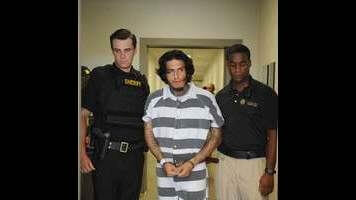
Of all the scenes in this week’s episode of American Crime, none were as authentic or moving as the one that takes place in Gwen’s hospital room. Still recovering from her traumatic brain injury, Gwen is questioned by an investigator, in the hopes that she can positively identify Carter as the man who attacked her. At this point, the case against him is so weak that the prosecution needs the word of a disoriented woman in order to solidify it.
But when the questioning begins, the audience finally begins to witness the breadth of Gwen’s loss. She has lost her husband, yes, but she’s lost her memory, her functionality. She looks at the investigator with wide eyes, like a child who’s trying as best they can to help but is terrified that their efforts aren’t good enough. Gwen can’t identify Carter, but more than that, she can’t even remember the night of the incident. Hell, she can’t remember the week of the incident. The last thing she remembers is a trip to Goleta, to see the butterflies. Matt wasn’t even with her on that trip, but her parents were. She speaks in short, stilted sentences of sitting in the backseat of the car and wanting to be a kid again.
As much as I’ve thought American Crime rather original in how it chooses its plot progressions, this episode makes me begin to think otherwise. Gwen’s scene was touching and her sitting in the back of her parents car while her marriage was in crisis and wishing she could go back to the simplicity of childhood makes sense, but the show itself is obsessed with childhood and how it seems to be completely impossible for someone to make it through the gauntlet of maturation without somehow being insurmountably damaged by their surroundings.
It’s true, family and friends and circumstances do play a big part in who people become but time and again the show draws a straight line between choices parents make and the (always) devastating repercussions that befall their children. Watching this show makes parenthood seem like a fool’s errand, you’re damned if you do and damned if you don’t. Barb’s racism negatively impacted the way her sons saw the world. Russ leaving doomed them to a life of poverty. Alonzo being overprotective made Tony lash out. Aubry’s foster brother abused her. No one’s family is perfect, but on American Crime that means that your life is almost certainly going to end up in ruin.
The last example, of Aubry’s abuse within the confines of the foster system is another cliché. Sadly, many cliches are born out of fact, but Aubry didn’t need another reason to be self-medicating. American Crime seems to not have enough faith in its own narrative to trust that the audience will find a way to connect with its characters or it won’t. Layering in additional horrors doesn’t serve as nuance, it turns serious issues into something trite, an afterthought.
By the end of the episode, the only person working to improve themselves and their situation is Hector, the one character who’s completely alone, without the complicating element of family. Hector, despite being a lynchpin to the case against Carter is often stranded in his own show, not even a blip on anyone’s radar. But since his incarceration, Hector has been working to better his position and his life. He may not do it in a particularly likable way, but he leaves his gang. He fights to improve his position and the likelihood of him not getting extradited to Mexico. Without the burden of other people, Hector is able to be relentless to improve his own position, no matter what the cost.
With this, American Crime sends a message that it likely doesn’t intend, which is that only through isolationism can a person really be free of that which holds them back. Which, is fine, I suppose, if you’re really into the collected works of Ayn Rand, but doesn’t seem like the best fit for a show ostensibly about the ongoing race problem in America and the ways the criminal justice system often fails us.
In a country still struggling with how to civilly discuss race in a world where police shootings of unarmed individuals is becoming frighteningly routine, television needs a show that can look at these situations through fiction, but with the same bracing reality that we face every day. American Crime needs a course correction, a hard left turn from family melodrama into something significantly more human: reality.
Stray observations:
- Nancy meets up with her ex-husband in an annual anniversary regarding their deceased daughter and he warns her from allying too closely with Barb, a woman who is clearly a flaming racist. I’m glad someone is looking out for her best interests.
- Barb has a new ally who may or may not be as racist as she is but only time will tell.
- Mark is so determined to fix things for Gwen it absolutely seems like he has a thing for her. Which is exactly the kind of soapy melodrama that this show doesn’t need.
- I wonder if I could stream Good Morning, Stockton online.
- Aliyah is beating herself up for doing her brother wrong, which is more generous than I would be in a situation where my sibling just cost my peers hundreds of thousands of dollars.
- Tony’s new friends decided that the guy that jumped Jenny deserved a little street justice and delivered it in the form of a pipe beatdown. They then, of course, filmed it, which is surely nothing that will come back and haunt Tony in the future.
- The pressure has started mounting on Aubry to turn on on Carter. It’ll be interesting to see how long/if she’s able to hold out or if it turns out love just isn’t enough.